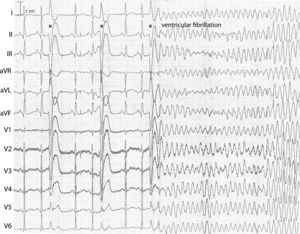DPP6
DPP6 haplotype causing idiopathic VF
Auteur: Louise R.A. Olde Nordkamp
Supervisor: Arthur A.M. Wilde
The DPP6 haplotype was recently associated with idiopathic ventricular fibrillation in several families in the Netherlands.[1] The DPP6 haplotype is a founder haplotype from the Netherlands, which indicates that the families with the DPP6 haplotype are descendants from the same ancestors.
General features
- The diagnosis is based on the presence of the DPP6 haplotype during genetic screening in familial idiopathic VF.
- The resting ECG is normal and the heart is structurally normal.
- It is an inheritable cardiac arrhythmia syndrome with an autosomal dominant inheritance.
- The arrhythmias typically occur between the age of 20-60 years.
- The penetrance of idiopathic VF is high: 50% of the male DPP6 haplotype carriers experienced (aborted) sudden cardiac death before the age of 58 years.[2]
Clinical diagnosis
The diagnosis is based solely on the presence of the DPP6 haplotype.
Physical examination
Patients can present with symptoms of arrhythmias:
- Out-of-hospital-cardiac-arrest
- Syncope, pre-syncope (weakness, lightheadedness, dizziness)
ECG tests

The resting ECG in patients with the DPP6 haplotype is normal. Also during Holter recordings and exercise tests, no abnormalities are found. However, ICD read-outs of DPP6 patients revealed that VF in these patients is elicited by very short-coupled ventricular extrasystoles from the right ventricular apex.
Genetic diagnosis
Haplotype-sharing analysis implicated that chromosome 7q36 harboring DPP6 was involved in familial idiopathic VF in several families in the Netherlands. DPP6 is a modifier of the cardiac transient outward current (Ito). It is believed that an increased expression of DPP6 is causal to the proarrhythmic substrate.
Risk Stratification
At this moment, it is only possible to determine the risk of idiopathic VF in asymptomatic family members by DPP6 carrier status. So far, no clinical characteristics on ECG, Holter monitoring, exercise test or on echocardiography or cardiac MRI are associated with arrhythmic events in patients who already have proven DPP6 carrier status. Future studies have to provide a more advanced risk stratification.
Treatment
- Currently ICD therapy is advised for both secondary ánd primary prevention of sudden cardiac death.
- In DPP6 patients with recurrent VF events or ICD shocks, isoproterenol or quinidine are known to be effective for VF suppression. Also ablation of the triggering ventricular extrasystoles from the right ventricular apex can be effective in these patients.
References
Error fetching PMID 21512816:
- Error fetching PMID 21512816:
- Error fetching PMID 19285295: